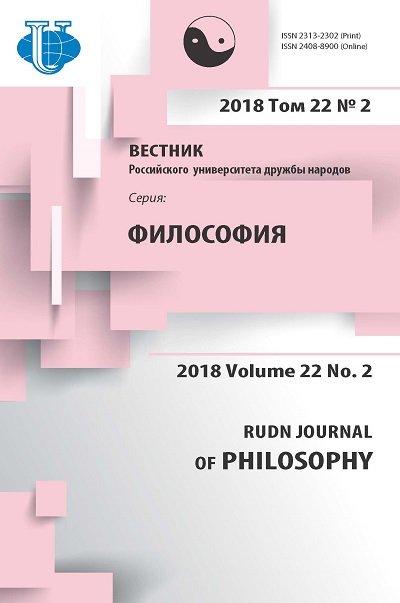Socio-philosophical grounding of the conception of proletarian culture
- Authors: Kolychev PM1, Khakhalova AA2
-
Affiliations:
- Saint-Petersburg State University of Aerospace Instrumentation
- East-European Institute of Psychoanalysis
- Issue: Vol 22, No 2 (2018)
- Pages: 206-216
- Section: SOCIAL PHILOSOPHY
- URL: https://journals.rudn.ru/philosophy/article/view/18715
- DOI: https://doi.org/10.22363/2313-2302-2018-22-2-206-216
Cite item
Full Text
Abstract
The currency of the research consists in the necessity if rethinking of the notion of culture in Russian contemporary thought in order to present more adequately the process of development of culture in a future. The paper aims to elucidate political origins of the movement of Proletarian culture that play the leading role in a creation of a new conception of culture. As a materials were used documents and archives, scientific paper of Russian and foreign researchers. As a maim method was used problematic-analytical reconstruction, explored in the framework of an enactive approach that allows to envelop the subject in its evolvement and to concentrate on concrete practical situations of its realization. Such reconstruction permits to accomplish the original interpretation of the problem. The authors focus in the pre-history of the movement. Analyzing the social-political context of the origin of the movement, the authors come to the conclusion about artificially created necessity of political enlightenment of the society by the revolutionaries. The paper demonstrates how agents of proletarian working circles manipulate by the public opinion of working class. As a result, the paper shows the process of formation the ideology of cultural movement revolutionary period and evaluates significance of ideological function in its realization. The authors produce critical evaluation of the history of the movement in original judgment about political grounding of culture.
Keywords
About the authors
P M Kolychev
Saint-Petersburg State University of Aerospace Instrumentation
Author for correspondence.
Email: piter55spb@gmail.com
-
Bolshaya Morskaya str., 67, Saint Petersburg, Russia 190000A A Khakhalova
East-European Institute of Psychoanalysis
Email: khakhalova@mail.ru
-
Bolshoy pr. PS, 18, lit. “A”, St. Petersburg, Russia 197198References
- Kagan MS. Grad Petrov v istorii russkoi kul’turi [The Grad Petrov in the history of Russian culture]. Saint-Petersburg; 1996. (In Russ.)
- Brown JE. The proletarian episode in Russian literature 1928—1932. N.Y.; 1971.
- McClelland JC. Utopianism versus Revolutionary Heroism in Bolshevik Policy: The Proletarian Culture Debate. Slavic Review; 39, No 3 (September 1980), pp. 403—25.
- Biggar J. Bukharin and the origins of the 'proletarian culture' debate. Soviet studies; vol. XXXIX, no. 2, April 1987, pp. 229—246.
- Thompson EP. Customs in Common. Penguin, Harmondsworth; 1991.
- Pipes R. A concise History of the Russian Revolution. Vintage books, New York; 1995. 313 p.
- Brown K. Agitprop in Soviet Russia. Constructing the Past; Vol. 14 Issue 1. 2013. pp. 5—8.
- Steila D. Gor’kij-Bogdanov e la scuola di Capri. Una corrispondenza inedita (1908—1911). Carocci editore, Roma; 2017. (In Italian).
- Gorbunov V. Bor’ba V.I. Lenina s separatistskimi ustremleniyami Proletkulta [The struggle of V. Lenin with separatist tendencies of Proletkult]. Voprosy istorii KPSS [Question of the History of KPSS]; 1958: Izdatel’stvo “Pravda” [Publishing House “Pravda”], № 1. pp. 29—39. (In Russ.)
- Protocoly Vserossiiskoi konferencii proletarskikh kul’turno-prosvetitel’skikh organizaciy [The Protocols of Russian proletarian cultural-educating organizations]. Moskow; 1918. (In Russ.)
- Bogdanov A. Proletarskiy Universitet [Proletarian University]. Bogdanov A. O proletarskoi kul’ture. 1904—1924 [About Proletarian culture. 1904—1924]. Leningrad; Publishing Inc. “Kniga”, 1924. pp. 236—262. (in Russ.)
- Bogdanov A. Kul’turnyye zadachi nashego vremeni. [Cultural objectives of our times]. Izdanie S. Dorotovskogo i A. Charushnikova, Moscow; 1911. (In Russ.)
- Bogdanov, A. // Deyateli revolutsionnogo dvizheniya [Agents of a revolutionary movement]. Bibliograficheskii slovar’: Ot predshestvennikov dekabristov do padeniya tsarizma [From the ancestors decabrists to the Fall of the Impire]; Vol. 5: Social-democrats. 1880—1904: Issue 1: А — B / composed by E. Korol’chuk & Sh. Levin. Ed. by V. Nevskiy. Мoscow; 1931. col. 372—379. (In Russ.)
- Lunacharski A. Vospominaniya i vpechatleniya [Memoirs and impressions]. Sovetskaiya Rossiya, Moscow; 1968. 346 p. (In Russ.)
- Khodasevich V. Proletkult i tp. Iz vospominaniy [Proletkult and suchlike. From memoirs]. Khodasevich V. Collection of works; Vol. 4: Necropol’. Vospominaniya. Pis’ma. [Necropolis. Memoirs. Letters]. М.: Soglasiye, 1997. pp. 223—228. (In Russ.)
- Ol’khovskiy E. Formirovaniye rabocheiy intelligentsia v Rosii v kontse — nachala XX veka [Formation of working intellectuals in Russia at the end of XIX — beginning of XX centuries]. Rabochiye I intelligentsiya v Rossii v epochu reform i revolutsiy, 1861 — fevral’ 1917 [Workers and Intellectuals in Russia in the times of reforms and revolutions, 1861 — February, 1917]; Ed. by S. Potolov. Saint-Petersburg, 1997. pp. 77—95. (In Russ.)
- Ocherki po istorii shkoly I pedagogicheskoiy vysli kontsa XIX — nachala XX vv. [Sketches on history of school and pedagogic thought at the end of XIX — beginning of XX]. Ed. by E. Dneprova. М., 1991. (In Russ.)
- Karpov A. Russkiy Proletkult: ideologiya, estetika, praktika. [Russian Proletkult: ideology, aesthetics, practics]. Publishing house SpbGUP, Saint-Peptersburg; 2009. 260 p. (in Russ.)
- Fel’dman M. Kul’turnyye tsennosti rabochich Rossii v pervyye desyatiletiya XX veka [Cultural values of Russian workers at first decades of XX century]. ONS. 2007. № 6. pp. 111—124. (In Russ.)
- Khakhalova A. Model' affordial'noi shemy kommunikativnogo protsessa [The model of affordial scheme of communication process]. Mysl'. Issue 21 (2016). pp. 138—150. (In Russ.)
- Kuznetsova K. Sotsiologicheskiye vozzreniya A. Bogdanova I sovremennost’ [Sociological attitudes of А. Bogdanov and Modernity], Saratov; 2010. (In Russ.)
















